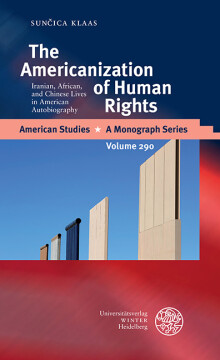
BUCH
The Americanization of Human Rights
Iranian, African, and Chinese Lives in American Autobiography
American Studies – A Monograph Series, Bd. 290
2018
Zusätzliche Informationen
Bibliografische Daten
Abstract
At least since The ‘New York Times Magazine’ proclaimed the triumph of the confessional narrative in 1996, the U.S. American literary market has been flooded with autobiographies by survivors of human rights violations. But why are these narratives so appealing to American readers and literary markets? Who gets to testify to victimization and survival in an autobiographical genre? What subjects are recognized as human rights personae and victims worthy of humanitarian rescue and what testimonial scripts and socio-political trajectories influence such recognitions? How is the American national community invested in these processes, and how do such autobiographies relate to the national technologies of screening, incorporating and containing potential members? The present study answers these questions by reconstructing the genealogy of the present encounter between the autobiographical and the human rights discourse and by presenting an extensive archive of contemporary autobiographies. by Iranian American women, the Lost Boys of Sudan, and Tiananmen dissidents, the study focuses on the epistemic injustices produced by unequal distribution of the rights to autobiography and humanitarian rescue.
Inhaltsverzeichnis
| Zwischenüberschrift | Seite | Aktion | Preis |
|---|---|---|---|
| Cover | C | ||
| Title Page | iii | ||
| Copyright | iv | ||
| Contents | vii | ||
| Acknowledgements | ix | ||
| 1 Beginnings | 1 | ||
| 2 “Women without Men” | 25 | ||
| 2.1 The Face of Iran | 25 | ||
| 2.1.1 Managing the Archives | 26 | ||
| 2.2.2 Reading beyond ‚Lolita‘ | 29 | ||
| 2.2 “A Truth Universally Unacknowledged” | 32 | ||
| 2.2.1 White Torture, Dark Lies | 37 | ||
| 2.2.2 Dark Skins, White Hearts | 44 | ||
| 2.3 “There is Nothing Political in American Literature” | 56 | ||
| 2.3.1 A View into the Room | 61 | ||
| 2.3.2 “A Room with a View” | 70 | ||
| 3 “This Time for Africa” | 81 | ||
| 3.1 “More than Humanitarianism” | 81 | ||
| 3.2 The Age of Innocence | 92 | ||
| 3.2.1 Mother Wendy | 93 | ||
| 3.2.2 Once upon a Time in the Never-ever-land | 98 | ||
| 3.2.3 In the National Embrace | 104 | ||
| 3.2.4 “The Transparent Eye-Ball” | 115 | ||
| 3.3 Children at Work | 121 | ||
| 3.3.1 “Democracy and the Foreigner” | 123 | ||
| 3.3.2 Democracy and the Orphan | 129 | ||
| 3.3.3 The Adopted Bonds of Responsibility | 133 | ||
| 3.4 Beyond This Point Are Only Lions | 145 | ||
| 4 MADE IN CHINA | 165 | ||
| 4.1 “Winds of Change” | 165 | ||
| 4.1.1 “The End of History” | 171 | ||
| 4.1.2 Epistemic Communities | 179 | ||
| 4.2 “I Love Beijing in the Springtime, I Love Beijing in June” | 189 | ||
| 4.2.1 “The Tank Man” | 191 | ||
| 4.2.2 The Romance of the Democratic Covenant | 198 | ||
| 4.3 “The Woman Warrior” | 207 | ||
| 4.3.1 Getting Started | 208 | ||
| 4.3.2 “Human Rights Are Women’s Rights and Women’s Rights Are Human Rights” | 214 | ||
| 4.4 “T.S. 1989” | 224 | ||
| 4.4.1 “Norm Entrepreneurs” | 228 | ||
| 4.4.2 Made in USA | 232 | ||
| 5 Loose Ends | 243 | ||
| Bibliography | 251 | ||
| Backcover | 270 |


 Publishing Platform by CloudPublish
Publishing Platform by CloudPublish